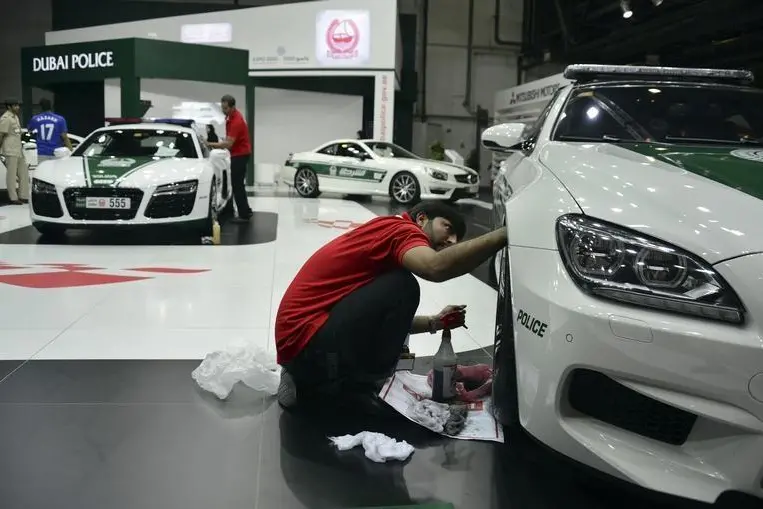PHOTO
The future of mobility will not revolve solely around electric vehicles, but will be a combination of autonomous, connected, and eco-friendly vehicles that boast greater safety features, experts said at the 15th edition of the Dubai International Motor Show.
The event was inaugurated by Sheikh Ahmed bin Mohammed bin Rashid, Chairman of the Mohammed bin Rashid Al Maktoum Knowledge Foundation, on Tuesday at the Dubai World Trade Centre. The five-day event has drawn the participation of more than 90 companies from around the world, who will showcase the latest models as well as technological innovations in the industry.
One of the trends taking center stage at the event revolves around electric vehicles (EVs) and their role in connected smart cities.
"Mobility is steering towards a future that is connected, autonomous, and electric," said Thomas Klein, president and CEO of Mercedes-Benz Cars Middle East. "Semi-autonomous technology is already available in some of our models, such as lane-keeping assist, adaptive cruise control and emergency braking, automatic steering and automatic lane-changing. Our aim is to shape the mobility of tomorrow, both actively and responsibly, while also striving towards sustainability."
Klein noted that in response to the growing demands in the industry, Mercedes-Benz rolled out its new EQ brand, which aims to raise the bar on electric cars. "The first of these new vehicles is our answer to electric mobility, the EQC, which is powered by two asynchronous electric motors, and has a range up to 471km. Our transformation as a brand ensures we fulfill all customer needs, while our push for electric puts us in a strategic position to address the challenges of future mobility."
Similarly, Thierry Sabbagh, managing director of Nissan Middle East, revealed that Nissan has big plans for the future when it comes to sustainable mobility. The company showcased its Intelligent Mobility solutions, which are Nissan's approach to changing how cars are powered, driven, and integrated into society.
"We introduced Nissan Intelligent Mobility back in 1996, and initially the vision revolved around how we looked at the future of mobility through autonomous and connected vehicles. Since then, we have built on this vision. Today, all the new vehicles that we are launching in the market are delivering on certain aspects. The industry is changing in different ways and we want to ensure that we are pioneers in this change. Vehicles are going to become more connected, greener, and autonomous, and they will deliver more on the promise of safety and security," he said.
He added that there is a global trend towards adopting electric vehicles and that governments are heavily invested in reducing CO2 emissions. "We are firmly entrenched in this vision, and we have to work hand in hand with the government to ensure that the proper infrastructure is in place to accelerate that adoption of electric vehicles. Internal combustion engines are still going to be present in the near and mid-term future, but we are already seeing our customers becoming more educated about the benefits of electric vehicles."
Nissan, which is the Official Automotive Partner of Expo 2020 Dubai is set to demonstrate and showcase the future of intelligent mobility at the event. Through the partnership, Nissan will provide an extensive fleet of almost 1,000 vehicles to support in the preparation and successful delivery of Expo 2020 Dubai.
"We are going to have a very strong presence at Expo 2020, and we are going to showcase vehicles and solutions that are going to re-define the future of mobility," Sabbagh said.
Mitsubishi, which took the opportunity to showcase the 2020 Mitsubishi Outlander plug-in hybrid electric vehicle (PHEV) SUV, also looked back at the evolution of the segment and the response that it has seen in the Middle East.
C.V. Ravin, general manager of Sales at Al Habtoor Motors, noted that Mitsubishi expects the 2020 Outlander to receive a warm welcome in the UAE and Middle East region. This, he said, is mainly due to the government's efforts in promoting clean energy and reducing carbon emissions.
"Education plays a huge role in the success of the EV concept," he said. "People have to let go of certain misconceptions that they have about EVs. One of these misconceptions revolves around the price of these vehicles. Many motorists think that these cars are much more pricier than their alternatives. Of course, that is not to say that infrastructure support is not as important; we have seen the Dubai Government launch several initiatives that are helping to support the growth of electric vehicle infrastructure including charging station in malls and community parkings."
Ivo A. Kapitzki, GM of Mercedes-Benz Passenger Cars, at Gargash Enterprises, also hailed the efforts of the government and said that he is excited about the future of the automotive industry in a city such as Dubai. "Dubai is a very exciting place to be when it comes to innovation in the automotive industry. In a couple of years, we will see an increasing number of cars on the road that are not just electric, but also autonomous and connected. Convenience will play a major role in shaping the major trends in the market as residents will always look at what is convenient for them when moving around in their vehicles."






















